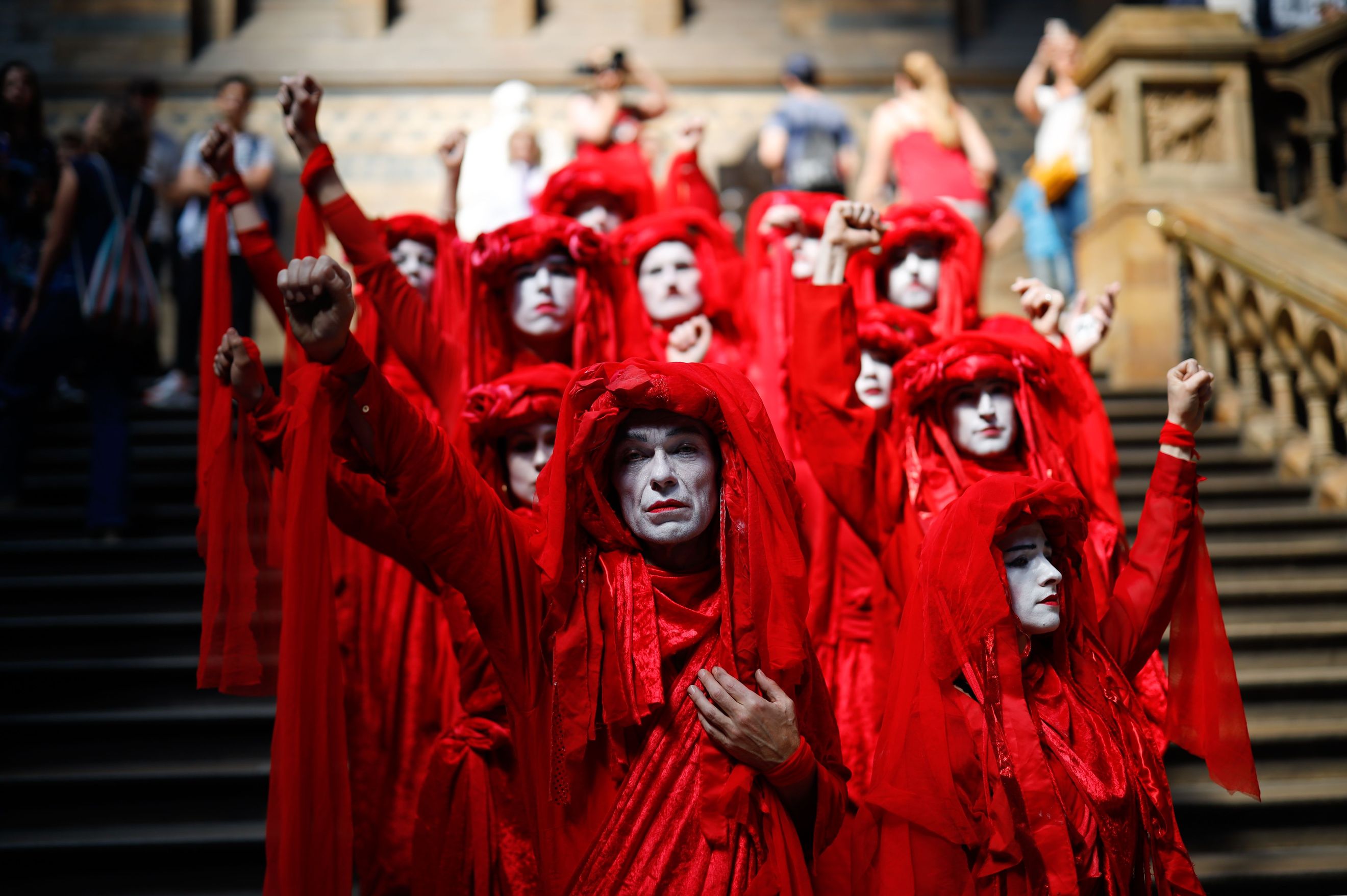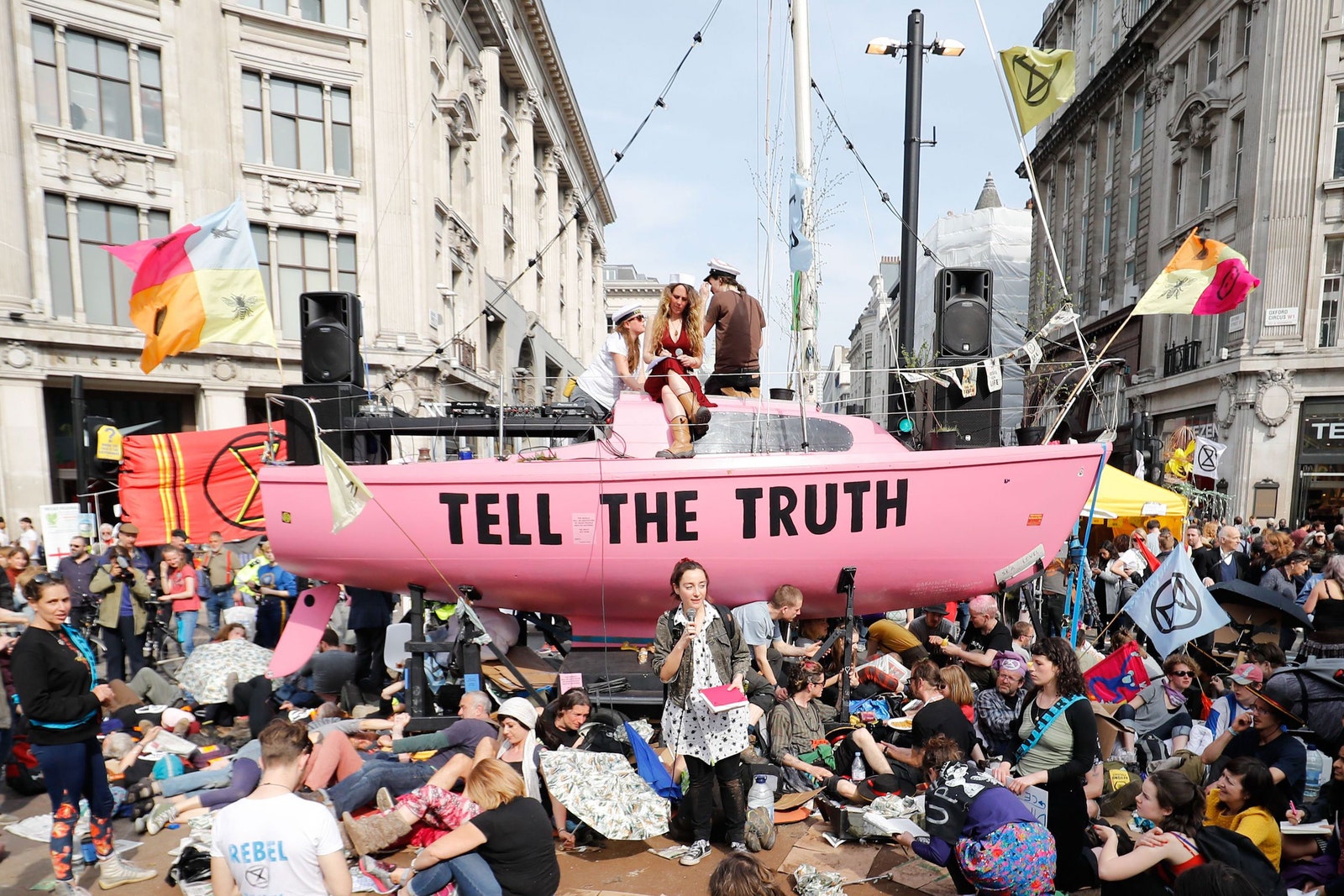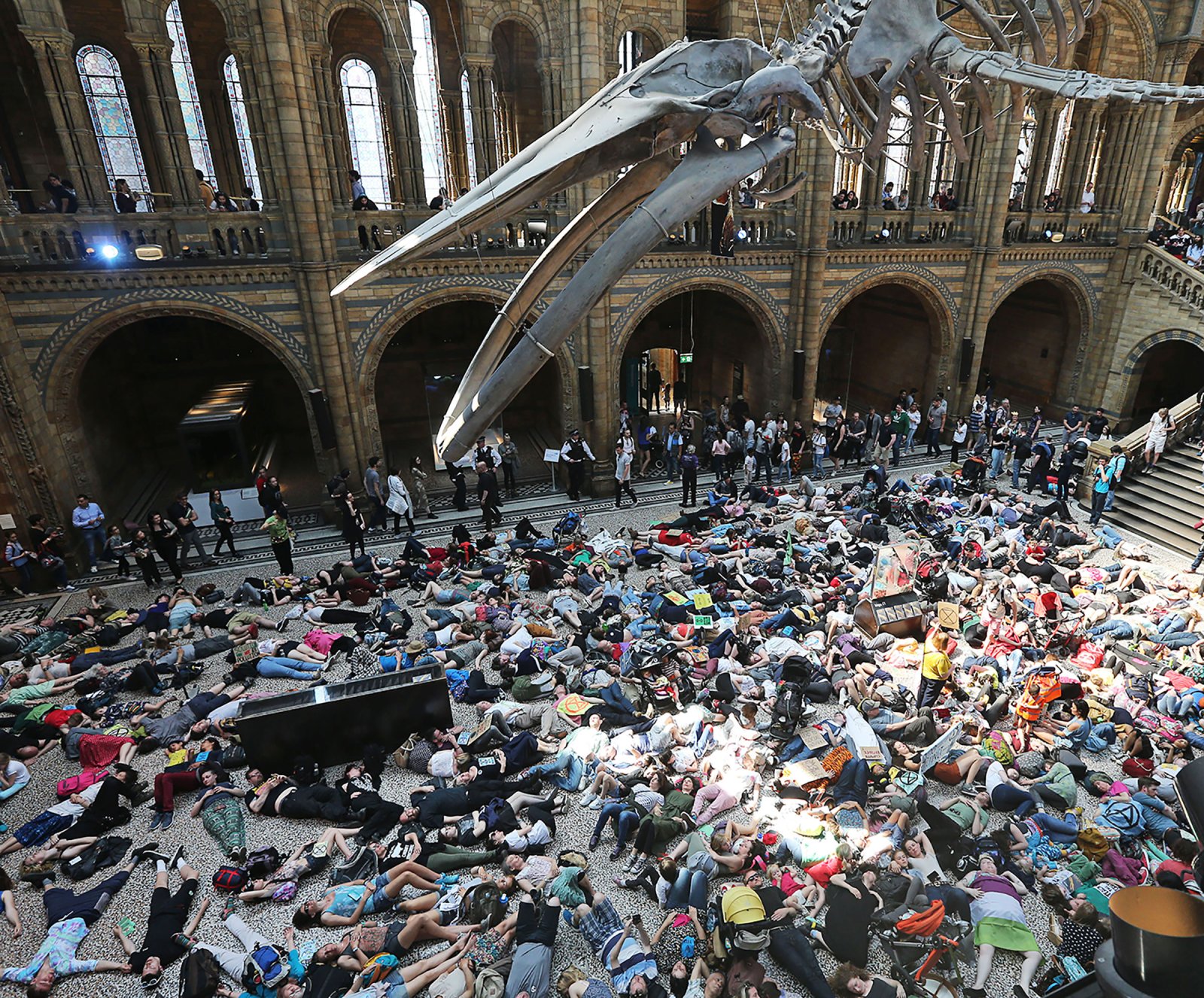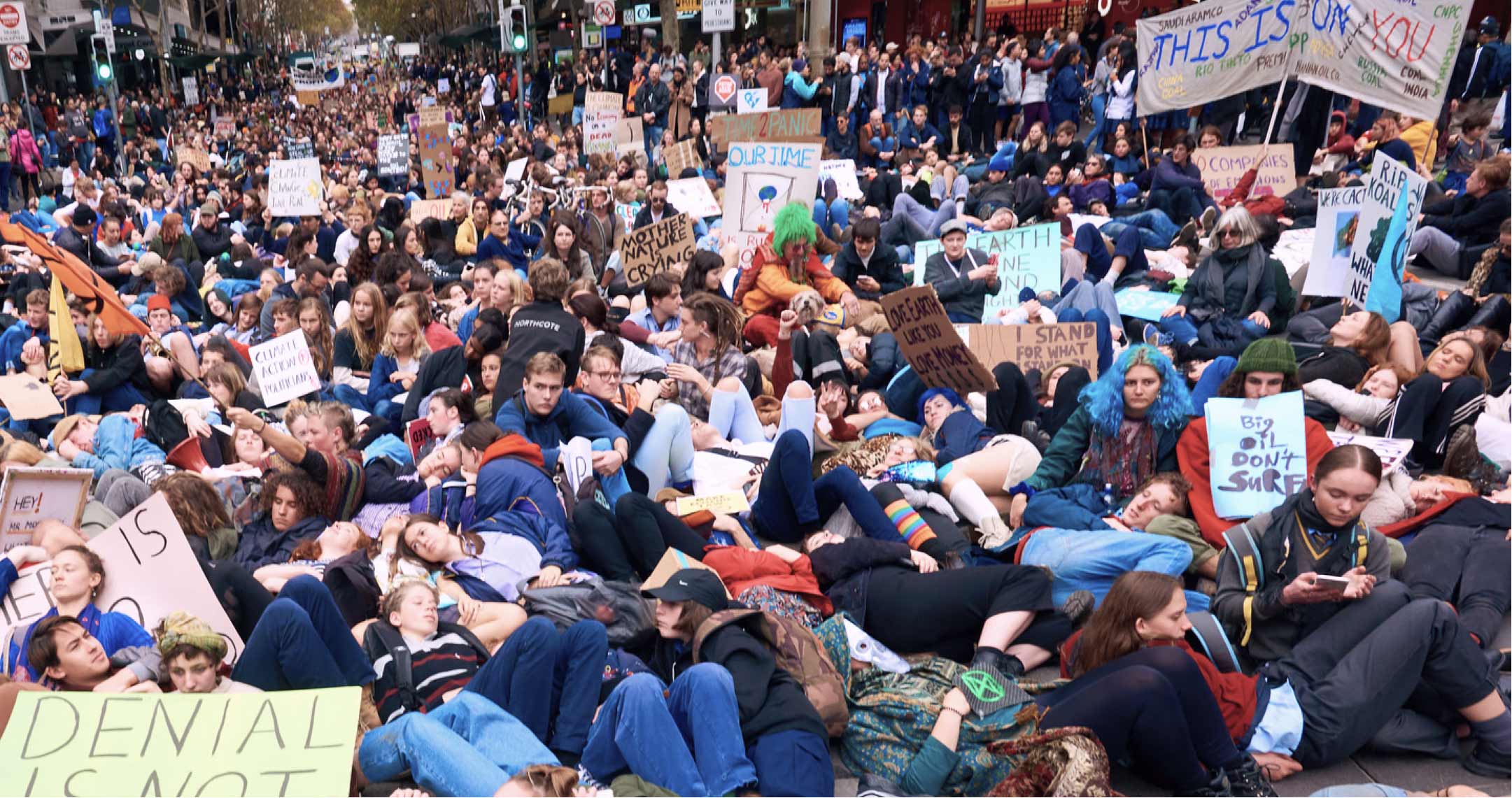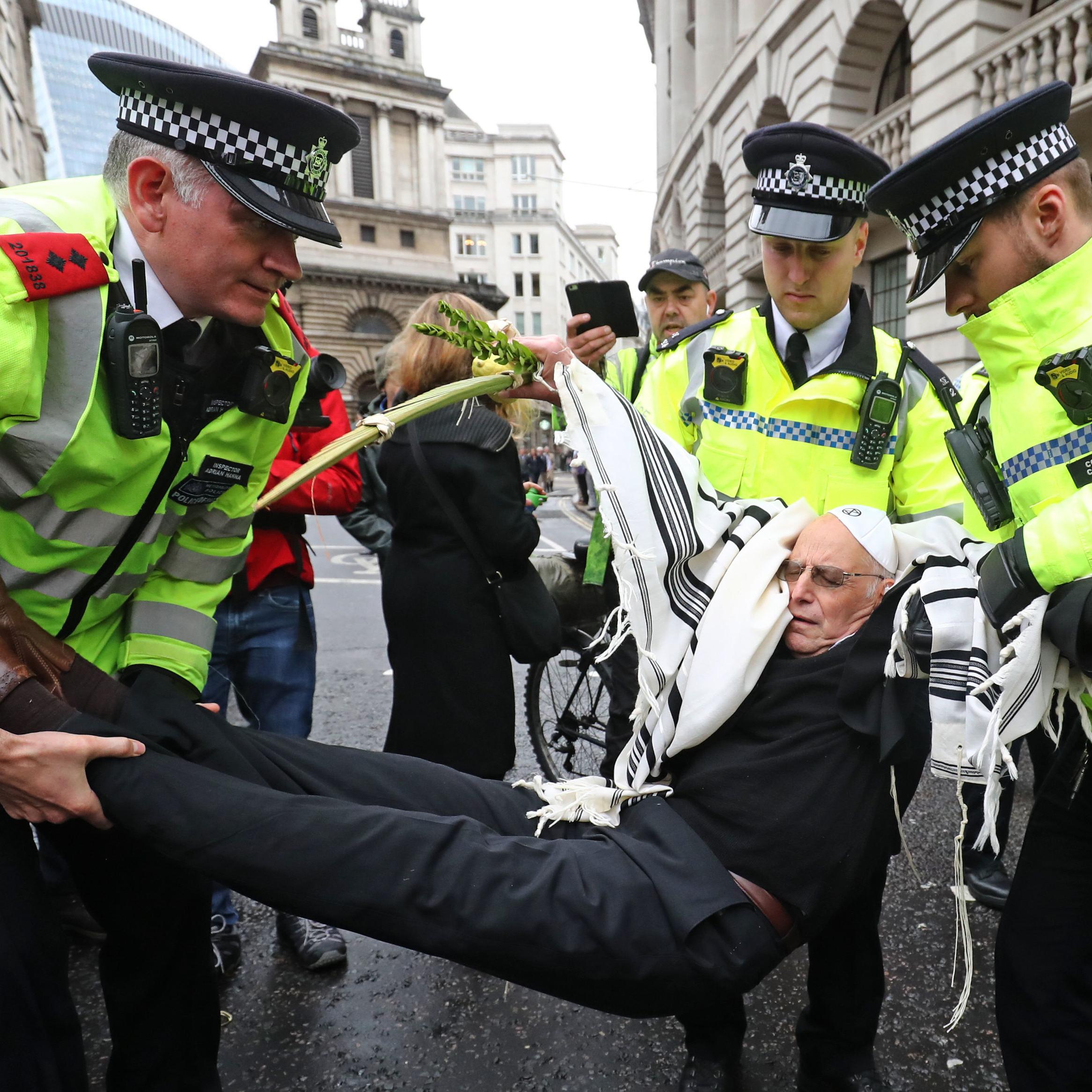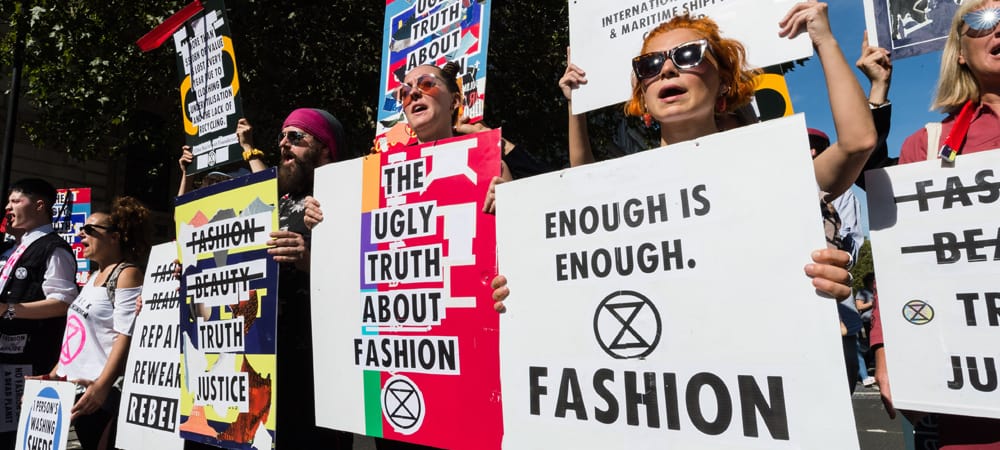19 October 2022
AUTHOR:
YANCEY STRICKLER
INTERVIEWED:
CHARLIE WATERHOUSE
CLARE FARRELL
EDITOR:
BRANDON STOSUY
Public record
Extinction Rebellion on decentralization over time
Since launching a series of “Rebellions” in London in 2018, the activist group Extinction Rebellion has used civil disobedience to raise the alarm about climate change. Their campaigns have resulted in mass arrests, front-page headlines, and, for some members, imprisonment for their actions. They’ve also created results: from London and many other cities declaring a Climate Emergency to creating more media about the stark consequences of climate change and the need for action.
Regardless of how you feel about their methods, Extinction Rebellion make the facts impossible to ignore.
Extinction Rebellion are also one of the largest and most diverse holocracies in the world, with a flat, horizontal structure and a “post-consensus” culture meant to bias towards action rather than deliberation. After four years of building a global movement using this structure, they've experienced first-hand the many forms of epiphany and challenge that come with coordinated action at unprecedented scales.
Two of the key figures behind Extinction Rebellion are cofounder Clare Farrell, who leads design and messaging for the group, and Charlie Waterhouse, a designer who’s part of the Art Group. Earlier this year Clare and Charlie shared with Public Record their experiences participating and operating within decentralized structures over time.
There's a tension between wanting to create an open space where anyone can contribute and the drive to do things and make decisions. How do you deal with the struggle between consensus and action?
CHARLIE WATERHOUSE: I've always been a fan of keeping the circle small. On the creative side of things, it's important to have a relatively small set of people whose opinions matter. Not from a power point of view, but people who know what they're talking about: using them as a sounding board, making sure that you get consensus among that small group, then making sure you talk to the wider group.
This is something Extinction Rebellion’s not necessarily gotten right very often. Don't get me wrong, it's a wonder we do anything with the number of people involved, but when people get involved in stuff because they're interested in it, rather than getting involved because it's their specialism and it's what they do, that's when the ability to make decisions becomes difficult. Opinion gets confused for insight.
CLARE FARRELL: If you’re clear at the start about the way you're going to make stuff work, that’s the best. It's a scale thing. If there are five people, then happy days. If there are 500 people, usually fewer happy days. It's easier with a smaller group to know that you're all on the same page.
Something I learned early on when we were trying to have a big collective strategy process — which had 25 people in a room — when someone said, “Let's have a session on purpose so we align on purpose.” It went around the room, and everyone's purpose was different. Some people wanted to fix the terrible design of our economy. Some people felt strongly about the loss of biodiversity. Some people felt strongly that the reason we've got such a shitty system is because of patriarchy, because we live in a domination paradigm.
Once you drill into that stuff collectively, you realize there's less and less point of agreement. It went around the room and one person spoke very late. He said, “To be honest when a collective of people try to align on their purpose with specificity like this in a big group context it only ever breaks them apart rather than what the intention is, which is to sit down and all come together.” You end up with so much feedback that's conflicting you realize there's no way to please everybody.
At points there have been difficult decisions that need to be made, which relate to how we engage with real systems. How we fund ourselves and how we distribute funds is where an organization like ours—or a disorganization like ours—meets normality. Because we don't fit, you find a point of tension where the movement has no legal structure and is very horizontalist-meets-a-directorship. Wherever there is a limited company, there are directors, there are legal responsibilities, and they're on certain people's shoulders.
Sometimes there's a bit of resentment towards the people who are taking this risk. There was a sense at one point of some people saying, “Well, who are they? Who do they think they are?” Well, they’re the people that put their neck on the line and continue to do so. They're the people who put their houses into trust so that if they get sued, and everything goes very bad, and they go to jail, they don't lose their home. There's an interesting lack of appreciation for that risk, because it gets seen as power. Then you ask yourself, “Who has the privilege to take that risk?” And, yeah, there's some privilege there. But from where I'm sitting, the privilege is a fair thing to question, but actually it's also a lot of brass ovaries. [laughs] It's people who've got the balls to do it. That doesn't get so much respect in a horizontalist culture.
Designing means of engagement that are real, and not just people being heard, is difficult. If you want to open up to listen to a lot of opinions, but know that you have to funnel it through a small group that can make decisions, it can be challenging. If you make too wide a process with a large number of people, it feels that they've not been listened to. It means that they've voiced something but it gets ignored. If things were to close down, and people can't get any access, then that also can be problematic. But the antidote, in some ways, is transparency.
CLARE FARRELL
You're going to be able to be more agile and make decisions better as something hierarchical than you would with a flat process. My understanding with Occupy Wall Street is they’d spend a day deciding where to put the bin because everyone had to agree. [laughs] But arguably the success in the movement didn't really rest on where that bin went on site. It's helpful to have leaders that can hold the decision-making almost in a hierarchy of priority — “This is an unimportant decision,” or “This is a very important decision." You can grid them out. That classic “is it urgent and important” or “is it urgent or important.”
We’re moving through a difficult phase now. We went through a lot of demands on horizontalism, and we're part of a process that elected a very small team to do a strategy because we tried something so flat last year that didn't work. That's supposed to be the holocratic sensibility that was baked in from the start, but of course, when it grows to such a big scale, it's hard for people to hold a system that's trust-based because you don't have trust because everyone doesn't know everyone anymore. It's too big. It's about trust and legitimacy of the people who make the decision. How you get that back in a decentralized system is quite challenging.
Can you talk more about being post-consensus?
CLARE: It’s how we tried to work from the origins of XR. Say you're coordinating the media team. It's like a startup: you know you do some of the bits well, because that's what you do, and that's why you're starting the thing, but then you also know that you don't know how to do your books, and you also know that you don't really know how to do HR, or whatever. There are lots of gaps in your knowledge and you sometimes have to fill them.
We’d have various suboptimal people stepping into roles that are quite important, but actually just needed to get done. If they were doing it in a certain way which seemed like it wasn't quite right, and you thought you had some input, you could give them feedback. They can take your feedback, and they can also decide not to act on it if they think that they've had some other feedback which is better, or if they just think that they know better and that they don't agree that they're doing a bad job. What that created is somebody clearly not delivering on their mandate. Because there's not a higher power, how do you say to somebody, “You don't do anything on this list of responsibilities well, therefore, we should totally replace you, because we've given you loads of feedback, and you're still not really doing it.”? Governance becomes difficult in terms of who's holding the responsibility for the responsibility holders.
CHARLIE: Where post-consensus really works is when people have been used to working collaboratively. Often people confuse consensus and cooperation with collaboration. When XR works best is when it realizes that it's a creative project. Because people understand that people have certain skills and you collaborate: you bring in a photographer, you work with someone who works in metal or fabric because it's not your specialism, you understand that you have applied ideation process which is then interpreted by other people, and you get used to giving freedom to other people because they will interpret something and make it better. You appreciate that alchemical quality that you can only get when you let go of things, when you hand something on to someone else.
MEMBERS
Global (across 100+ countries), volunteer-based, and largely operated as a horizontal holocracy
Key Releases
2019: "Pink Boat" Rebellion (repeated and memed around the world)
2021: Women’s Rebellion (smashing windows)
Background
Founded in the UK in 2018 through a Declaration of Rebellion, Extinction Rebellion is a distributed global and politically non-partisan collective identity for non-violent direct action. Extinction Rebellion considers themselves to be a decentralized, post-consensus organization. Within the organization, anyone has permission to act in the group’s name so long as they follow the group’s rules.
Purpose
To support ecological and climate justice by using non-violent direct action to pressure governments to act on the climate emergency.
Part of shifting culture is being novel, standing out, getting press, which makes me think about the actions you choose to take. How do you decide about actions? Is there a rhythm of action?
CLARE: One of the things that’s interesting about watching the horizontal-ness of the movement happen is the structure is not firm—it's self-governing and self-evolving. A team that decided what happened in April didn't decide what happened in October. And another team rearranged itself and claimed some of the responsibility to be able to redesign something that happened for the next phase. We’re on a bit of a cycle of six months or something. You go in spring, and you go in late summer, early autumn. People have a bit of hibernation time in the winter, where things go pretty quiet.
Erica Chenoweth's research showed that the frequency of actions is also important. How many things are happening throughout the movement—not just the big things, but how many family groups are getting together to do things on a Sunday afternoon, or how many people are holding talks or whatever. There's a question about the frequency of what we do when we’re at our biggest and most powerful, which is obviously when everyone does the same thing at the same time. There are a lot of things that people want to do and trying to accommodate all of them, that's what people feel it means to say “this is empowering people” — allowing lots of different stuff to happen. What I think needs to happen now is everyone does something that's more singularly-defined, so it's simpler and more restrictive, but it allows for things to happen over a longer time period — so they don't all come to London in one week, but they all come to London over five weeks and make it sustained.
In terms of designing actions, I think we've got to go back to a simpler approach, which hopefully can then be more inclusive, because you don't have to know the special people to get involved, you don't have to be part of a special secret group. There was difficulty in doing action that's inclusive over the pandemic, so some parts of the movement reverted to a secrecy culture, where you organize something quite big but it's only got a handful of people and everything's a secret until just before. That makes it very difficult to include people who just want to show up. Which, if you're aiming for success, you need to be able to include. When you're on the ground, you build momentum, and people need to be able to come in and get involved. There's design stuff there that we're trying to reflect on and think is important. But yeah, there are many different ways that people decide to do actions. Sometimes someone has a spark and says, “I absolutely need to go and smash a window,” and they go and do that. [laughs]
What does it mean to support a release? If you have an action, you’ve got to do press, maybe there's some financial component, maybe it costs you money to support releases in some way, to bail people out. I imagine there are more meat-and-potatoes factors that come into play when thinking about how frequently you do something, or what scale.
CLARE: One of the things that's definitely in consideration is whether it's materially disruptive. It can be that you get a lot of people who want to do actions, but they want to dress up somewhere and go stand outside or go and do some theater piece. We're always encouraging people to make sure that there is an element of material impact, whether you've got some people who are going to block a road or some people are going to glue themselves to the door. It feels reductive to talk about it in terms of arrest, but we have always recognized that being arrested for your beliefs versus not being arrested is a serious material difference to the work, which we think has significance.
CHARLIE: The problem that we create for ourselves is we’re not a label with lots of releases, we're a genre with lots of labels. In terms of the actions: I often think about the cliché that John Peel said about the Fall, which was “always different, always the same.” Our challenge is to have that individual voice and that recognizable voice. We've said this in our strategy, repetition is our friend, but it's got to be the right kind of repetition. You always knew you were listening to a Fall record.
Where does money come from?
CLARE: The majority of the money comes from crowdfunding that kicks off around Rebellion time. We make a lot of money when we make a really big noise. It means we're eternally in a place of having a cashflow problem because to pay for the rebellion you have to shell out money to buy boats or sound systems or whatever it is that we're doing.
We started out with a system where a working group could have a budget holder, and they could pitch in for the money to a pot that was managed by a finance team that didn't want to have anything to say about what should or shouldn't be spent on, but just to receive the applications. If the applications exceeded what was available, then they'd bring together those budget holders to negotiate between themselves. “Does the system need more, or does it need less?”
This goes back to what we were talking about before in terms of scale. It works well at a small scale, and I don't think it works well beyond a certain scale. If you've got 15 budget holders and they've all got different responsibilities, everybody's become siloed and they think that their work is more important than everyone else’s. You end up with a competitive system more than a cooperative system.
There has been some institutional funding that's come in from big donors or foundations. That has its pros and cons. We don't take money that has strings in terms of what we can use it for, that directs our purpose. But we do take money sometimes if it's like, “We're a charitable foundation, so we can't fund superglue and D locks, but we can fund your social media campaigns, and we can pay for you to pay your accountants for the year, and we can pay for some of the stuff that's in the background.”
What's interesting is that we had a big donation early on which wasn't for use for anything illegal. It skewed the spend towards non-essential work. At the time we were just like, “Yes, they've given us six figures and this is going to really help.” Really early on, it felt huge and it was huge. But I often wonder how that affected the development of the organization because it's an organic system. If you've pumped some cash into one part of it, that bit just naturally grows, and the other bits naturally struggle. That's an interesting reflection on money for me over the years.
In terms of paying people, it’s a huge problem working out how you can get the most out of the money that you do have, whilst knowing that you're not really an employer. We give people expense money, but that's all a bit tricky, because we're not paying people well, we’re not paying people properly. We're not volunteer-led, but we've also avoided being a movement that has a center with a salary of professional people that are paying a mortgage and everyone else is a volunteer who's breaking their back. We've done something that breaks that system, but in a way, because we can't meet the real world with a redesign that's so fundamental, we meet a lot of problems along the way. We're in need, over and over again, of a creative solution to how to develop something that meets the needs on both sides.
It's amazing to me that we still exist. A lot of this was set up with, “Let’s be idealistic, let's make it radically different, because, obviously after a year or two, they're gonna shut us down.” [laughs] But they haven't done that yet. They haven't frozen the bank accounts.
CLARE FARRELL
What does it mean for someone to be a part of XR? Are there growth paths for someone to grow internally within XR to become a leader? How do you think about who's a part of it, and in what ways, if any, do you define their relationship to it?
CLARE: It's a huge difficulty. There are some spaces I wish we could just bring people in, but actually finding people that can be a good fit and having a good onboarding process, and having a good way of holding them to retain them and encourage them — I find it really difficult. Because we're volunteer-based, and those of us who do get money get such shit money, it's hard to get people that are good at certain jobs unless they're gonna go all out, and they're like, “I'm gonna quit my job. And I'm here, this is important, and I believe in it.”
At the beginning it was such a big influx of people that we couldn't possibly manage it. It was growing and growing and growing, and the system, because it can change itself without really having to answer to very much, also ballooned, so we ended up with a very complex system of national working groups, some of which we arguably just don't need.
Something that we're wrestling with now is how we support people to grow into leadership, because there's something needed there. We never set it up to be solely horizontal, but because so many people who come into the space are into that, and do want that and do ideologically align with that, then there's been an impact over time of people having a go at the people that do show leadership. Then it becomes a very unappealing thing to do. There’s a problem with that kind of culture, because it means that where you do get good leadership, it's often not cherished by the broader system very well.
If you could do it all over again, what would you do?
CLARE: If I was doing it again I would try really hard to design a system of governance that can't get so out of control. Not because it's completely out of control, but because there's been such a struggle for legitimacy within the system. When we launched we knew that decentralization was an idea that was valuable. Some people had done much deeper thinking about it than others, and a lot of people, as it proliferated through the movement, were saying it but didn't really know what it meant. To be able to be much more critical about what it means to design decentralized systems, to understand the power of them and realize how hard they can be to change afterwards, would be valuable.
The simple answer, though, might have been to get banged up and put in jail sooner. I was ready at the beginning: “I'm ready to face the consequences.” Over time I've become more at risk of going inside for a custodial sentence and felt simultaneously less ready. Personally I just can't live in that way where I'm like, “I'm ready. I'm ready. I'm ready” — I can't live like that forever. We all build up to it together, and then, “Oh, they don't really want to bang us up at all, it was actually not happening.” Turns out was quite hard to do. [laughs] There’s a part of me that thinks if I just got to that point sooner, maybe things could have been easier or different or harder, and then easier for me personally.
If you'd like to support Extinction Rebellion's work, you can make a donation here.
